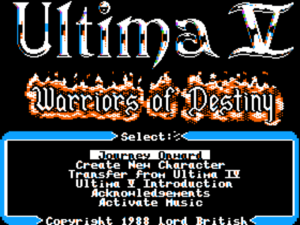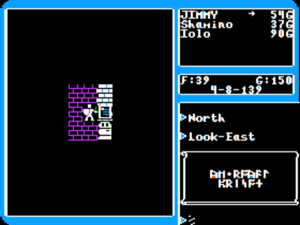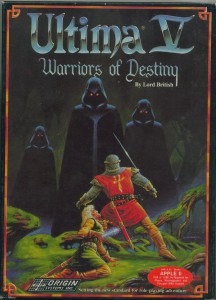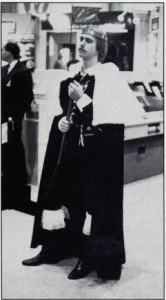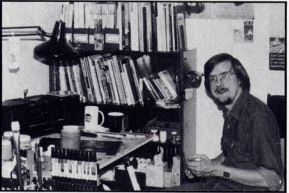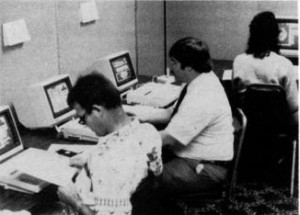Ultima V is a story about freedom of choice. You can’t put these [the eight Virtues] down as laws. It does not work to put these down as laws. They’re fine as a point of discussion, but it’s a completely personal issue. I would never try to build a pseudo-science of truth. This is never meant to be THE TRUTH. This is really meant to be, “Hey, by the way, if you just happen to live by these standards, it works pretty well.” It was never meant to be the one great truth of the universe that you must abide by.
— Richard Garriott
An awful lot of people get awfully exercised over the lore and legends of Britannia and the many failings of Richard Garriott’s stewardship thereof. Some of them spend their time in tortured ret-conning, trying to explain why the geography of the place kept changing from game to game, why its name was changed overnight from Sosaria to Britannia, or, even more inexplicably, why it suddenly turned into our own Earth for a little while there during the time of Ultima II. Others prefer to just complain about it, which is fair enough.
I have to say, though, that it’s hard for me to really care. For me, the Ultima series isn’t most interesting as the saga of Britannia, but rather as something more intimate. It’s the CRPG equivalent of the film Boyhood. As we play through the games we see its creator grow up, from the giddy kid who stuck supercomputers, space shuttles, and Star Wars in his fantasy games — because, hey, those things are all just as cool as Dungeons and Dragons to a nerdy teenager — to the more serious young man who used Ultima IV and, now, Ultima V to try to work out a philosophy for living. Taken as a whole, the series can be seen as a coming-of-age tale as well as a fantasy epic. Having reached a stage in my life where the former is more interesting than the latter, that’s how I prefer to see it anyway. Rather than talk about the Ages of Britannia, I prefer to talk about the ages of Richard Garriott.
What makes the process so gratifying is that the changes that Richard Garriott undergoes are, one senses, the changes that a good-hearted, thoughtful young man ought to undergo. Which is not to say that Garriott is perfect. Lord knows it’s easy enough to mock the sheer one-percenter excess of paying Russia a reputed $30 million to haul him into space for twelve days, and some of his public comments do rather suggest he may be lacking in the Virtue of Humility. But then, given how much his (alter) ego has been stroked over the years,[1]The classic hagiography of Garriott still has to be Shay Addams’s 1990 Official Book of Ultima. Here’s Garriott the teenage Lothario, deigning to allow some of his many girlfriends to sit with him while he programs his fantastic creations: “My girlfriends, who understood what was going on in those days and were a big part of my life, and who always showed up in the games, would sit right behind me in the same chair at my desk.” Resting her head on Garriott’s shoulder, she would “just sit there watching me program a few lines and test it, and watch the creation unfold.” And here’s Garriott the scholar, plumbing musty old tomes to come up with a magic system: “A full moon hovered over the skyline, casting a pale gold glow on the crinkled pages of the leather-bound tome as Garriott slowly thumbed through it at his desk. Magic was in the making, for his task was nothing less than to coin the language of magic that would be spoken by the mages and wizards of Ultima V. Planning to quickly ferret out a suitable synonym for poison and call it a night, he’d hauled the massive 11-language dictionary from the shelf hours ago. But so engrossed did he become with the subtle nuances and shades of meaning, so captivated by the alluring assortment of nouns and adjectives and verbs, that he sat over its faded pages long after choosing the Latin ‘noxius,’ from ‘noxa,’ to harm, and abbreviating it to ‘nox.'” it’s not surprising to find that Garriott regards himself as a bit of a special snowflake. Ironically, it wasn’t so much his real or imagined exceptionalism as it was the fact that he was so similar to most of his fans that allowed him to speak to them about ideas that would have caused their eyes to glaze over if they’d encountered them in a school textbook. Likewise, the story of the Richard Garriott whom we glimpse through his games is interesting because of its universality rather than its exceptionalism; it fascinates precisely because so many others have and continue to go through the same stages.
In Ultima IV, we saw his awakening to the idea that there are causes greater than himself, things out there worth believing in, and we saw his eagerness to shout his discoveries from every possible rooftop. This is the age of ideology — of sit-ins and marches, of Occupy Wall Street, of the Peace Corps and the Mormon missionary years. Teenagers and those in their immediate post-teenage years are natural zealots in everything from world politics to the kind of music they listen to (the latter, it must be said, having at least equal importance to the former to many of them).
Yet we must acknowledge that zealotry has a dark side; this is also the age of the Hitler Youth and the Jihad. Some never outgrow the age of ideology and zealotry, a situation with major consequences for the world we live in today. Thankfully, Richard Garriott isn’t one of these. Ultima V is the story of his coming to realize that society must be a negotiation, not a proclamation. “I kind of think of it as my statement against TV evangelists,” he says, “or any other group which would push their personal philosophical beliefs on anybody else.” The world of Ultima V is messier than Ultima IV‘s neat system of ethics can possibly begin to address, full of infinite shades of gray rather than clear blacks and whites. But the message of Ultima V is one we need perhaps even more now than we did in 1988. If only the worst we had to deal with today was television evangelists…
Garriott often refers to Ultima IV as the first Ultima with a plot, but that strikes me as an odd contention. If anything, there is less real story to it than the Ultimas that preceded it: be good, get stronger, and go find a McGuffin called the Codex of Ultimate Wisdom pretty much sums it up. (It’s of course entirely down to the first of these that Ultima IV is such a revolutionary game.) I sense a false conflation here of games with a plot with games that are somehow more worthwhile or socially relevant. “I’m writing stories,” he said during the late 1980s, “stories with some socially significant meaning, or at least some emotional interest.” But if we strip away the value judgments that seem to be confusing the issue, we’re actually left with Ultima V, the first Ultima whose premise can’t be summed up in a single sentence, as the real first Ultima with a plot. In fact, I think we might just need a few paragraphs to do the job.
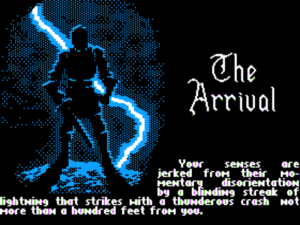
Thanks to Denis Loubet, Origin’s newly installed artist, Ultima V looks better than the previous games in the series even on a graphically limited platform like the Apple II.
So, after you became an Avatar of Virtue through the Codex of Ultimate Wisdom at the bottom of Ultima IV‘s final dungeon, you were rewarded for your efforts by being sent back to boring old twentieth-century Earth to, as the ending text so famously put it, “live there as an example to thy people.” In Britannia, the Council of Wizards raised the Codex to the surface by essentially turning the volcano that housed it inside-out, creating a mountain with a shrine to the Codex on its top. But this process created a huge underground void, an Underworld as big as Britannia’s surface that among other things allows Ultima V to make the claim that it’s fully twice as big as its predecessor. (No, the proportions of one volcano, no matter how immense, don’t quite add up to the whole of Britannia, but just roll with it, okay?)
Everything was still going pretty well in Britannia, so Lord British decided he’d like to embark on an adventure of his own instead of always sending others off to face danger. He got a party together, and they entered the new Underworld on a mission of exploration. Bad idea. He and his party were all killed or captured, only one scribe escaping back to the surface with a tale of horrors in the depths. “And this,” I can just hear Lord British saying, “is why I should have continued to let others do the adventuring for me…”
It happens that Lord British left one Lord Blackthorn as his regent. Now, with Lord British presumed dead, it looks like the post will become permanent. That’s bad news because Blackthorn, concerned that not enough people in Britannia are “striving to uphold the virtues,” has instituted a Code of Virtue to force them to do so.
- Thou shalt not lie, or thou shalt lose thy tongue.
- Thou shalt help those in need, or thou shalt suffer the same need.
- Thou shalt fight to the death if challenged, or thou shalt be banished as a coward.
- Thou shalt confess to thy crime and suffer its just punishment, or thou shalt be put to death.
- Thou shalt donate half of thy income to charity, or thou shalt have no income.
- If thou dost lose thine own honor, thou shalt take thine own life.
- Thou shalt enforce the laws of virtue, or thou shalt die as a heretic.
- Thou shalt humble thyself to thy superiors, or thou shalt suffer their wrath.
A number of your old companions from Ultima IV, opposing this Britannic version of the Spanish Inquisition, have become outlaws against the crown. They arrange to transport you back to Britannia from Earth to hopefully save the day. Garriott:
So, where Ultima IV was fairly black-and-white — I mean good guys are good guys and bad guys are bad guys — Ultima V unfolds in a gray area. Lots of characters try convincing you that Blackthorn is doing things just right, some say he’s an evil force, and others realize he’s wrong but are taking advantage of the situation for personal profit and are willing to fight anyone who opposes Blackthorn. You now have to operate more or less like a Robin Hood-style outlaw, working against the system but from within the system, which you must bring down philosophically as well by convincing key people in the government that they are wrong about Blackthorn.
Now we can better understand where the plot is really going. Crazily elaborate by previous Ultima standards though it is, the part of the backstory involving Lord British’s trip to the Underworld is mainly there to get him out of the picture for a while so Garriott can tell the story he wants to tell. “Rescuing Lord British in Ultima V is not really the focus of the game,” Garriott admits. “It’s just the final physical activity you have to do, like recovering the Codex in Ultima IV. It is how you do it that’s important.” Garriott wants to turn Britannia, all sweetness and light in Ultima IV (albeit with something of a monster-infestation problem), into a place every bit as horrifying in its own way as the Underworld. And, more accepting of shades of gray though he may have become, he isn’t quite willing to make Lord British — i.e., himself — responsible for that.
If all this isn’t enough plot for you, there’s also the story of one Captain John, whose ship got sucked into the Underworld by a massive whirlpool. There he and his crew stumbled upon one of those Things of Which Man Was Not Meant to Know, which drove him insane and caused him to murder his entire crew, then unleashed the three Shadowlords upon Britannia: personifications of Falsehood, Hatred, and Cowardice. It does seem that you, noble Avatar, have your work cut out for you.
It’s a much clunkier setup in many ways than that of Ultima IV. A big part of that game’s genius is to equate as closely as possible the you sitting in front of the monitor screen with the you who roams the byways of Britannia behind it. Opening with a personality test to assess what kind of a character you are, Ultima IV closes with that aforementioned exhortation to “live as an example to thy people” — an exhortation toward personal self-improvement that hundreds of thousands of impressionable players took with considerable seriousness.
All that formal elegance gets swept away in Ultima V. The newer game does open with a personality test almost identical to the one in Ultima IV, but it’s here this time not to serve any larger thematic goal so much as because, hey, this is an Ultima, and Ultimas are now expected to open with a personality test. Instead of a very personal journey of self-improvement, this time around you’re embarking on just another Epic Fantasy Saga™, of which games, not to mention novels and movies, certainly have no shortage. Garriott’s insistence that it must always be the same person who stars in each successive Ultima is a little strange. It seems that, just as every successive Ultima had to have a personality test, he reckoned that fan service demanded each game star the selfsame Avatar from the previous.
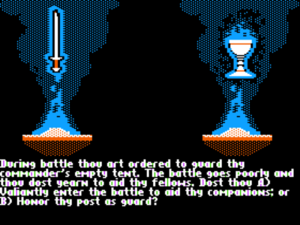
The gypsy and her personality test are back, but the sequence has a darker tone now, as suits the shift in mood of the game as a whole.
But whatever its disadvantages, Ultima V‘s new emphasis on novelistic plotting allows Garriott to explore his shades of gray in ways that the stark simplicity of Ultima IV‘s premise did not. The world is complicated and messy, he seems to be saying, and to reflect that complication and messiness Ultima has to go that way too. Nowhere is his dawning maturity more marked than in the character of Blackthorn, the villain of the piece.
CRPG villains had heretofore been an homogeneous rogue’s gallery of cackling witches and warlocks, doing evil because… well, because they were evil. In tabletop Dungeons and Dragons, the genre’s primary inspiration, every character chooses an alignment — Good, Neutral, or Evil — to almost literally wear on her sleeve. It’s convenient, allowing as it does good to always be clearly good and those hordes of monsters the good are killing clearly evil and thus deserving of their fate. Yet one hardly knows where to begin to describe what an artificial take on the world it is. How many people who do evil — even the real human monsters — actually believe that they are evil? The real world is not a battleground of absolute Good versus absolute Evil, but a mishmash of often competing ideas and values, each honestly certain of its own claim to the mantle of Good. Our more sophisticated fictions — I’m tempted here to say adult fictions — recognize this truth and use it, both to drive their drama and, hopefully, to make us think. Ultima V became the first CRPG to do the same, thanks largely to the character of Blackthorn.
Blackthorn is not your typical cackling villain. As Garriott emphasizes, “his intentions are really very good.” Setting aside for a moment the message-making that became so important to Garriott beginning with Ultima IV, Ultima V‘s more nuanced approach to villainous psychology makes it a more compelling drama on its own terms. The fact that Blackthorn is earnestly trying to do good, according to his own definition of same, makes him a far more interesting character than any of the cacklers. Speaking from the perspective of a storyteller on the lookout for interesting stories, Garriott notes that a similar certainty of their own goodness was the “best part” about the Moral Majority who were dominating so much of the political discourse in the United States at the time that he was writing Ultima V.
And yet, Garriott acknowledges, legislating morality is according to his own system of values “just the wrong thing to do.” He has held fast to this belief in the years since Ultima V, proving more than willing to put his money where his mouth is. The version of Richard Garriott known to the modern political establishment is very different from the Richard Garriott who’s so well known to nerd culture. When not playing at being a Medieval monarch or an astronaut, he’s a significant donor and fundraiser for the Democratic party as well as for organizations like Planned Parenthood, a persistent thorn in the side of those people, of which there are many in his beloved Texas, who would turn their personal morality into law.
As for Blackthorn, his evil — if, duly remembering that we’re now in a world of shades of gray, evil you consider it to be — is far more insidious and dangerous than the cackling stripe because it presents itself in the guise of simple good sense and practicality. A long-acknowledged truth in politics is that the people you really need to win over to take control of a country are the great middle, the proverbial insurance underwriters and shop owners — one well-known ideologue liked to call them the bourgeois — who form the economic bedrock of any developed nation. If you can present your message in the right guise, such people will often make shocking ethical concessions in the name of safety and economic stability. As the old parable goes, Mussolini may have been a monster, but he was a monster who made the trains run on time — and that counts for a hell of a lot with people. More recently, my fellow Americans have been largely willing to overlook systematic violations of the allegedly fundamental right of habeas corpus, not to mention unprecedented warrantless government spying, in the same spirit. The citizens of Britannia are no different. “In a society that is very repressive like this,” Garriott notes, “many good things can happen. Crime is going down. Certain kinds of businesses [military-industrial complex? surveillance-industrial complex?] are going to flourish.”
The ethics of Ultima IV are easy. Really, how hard is it to decide whether it’s ethical to cheat a blind old shopkeeper of the money she’s due? This time around, Garriott doesn’t let us off so easy. He puts us through the ethical wringer every chance he gets, showing us that sometimes there is no clear-cut ethical choice, only… yes, you guessed it, infinite shades of gray. Just like antagonists, ethical dilemmas become more interesting when they pick up a little nuance. Maybe they become a little too interesting; Garriott proves willing to go to some uncomfortable places in Ultima V, places few big commercial CRPGs of today would dare to tread.
At one point, Blackthorn captures one of your boon companions in Virtue from Ultima IV. He binds him to a table beneath a razor-sharp pendulum lifted out of Edgar Allan Poe. Betray the plans of your burgeoning resistance movement, Blackthorn tells you, and he will free your friend. Refuse and… well, let’s just say that soon there will be two of him. Scenes like this are familiar fare in movies and television, culminating always in a last-second rescue just before blade bites flesh. In this case, however, there will be no rescue. Do you watch your dear friend die or do you betray everything he stands for? If you let him die, Ultima V erases Iolo entirely from the disk, to deny you the hope of resurrecting him and remind you that some choices really are final.
At another point, you meet a character who holds a vital piece of information, but he’ll part with it only if you exorcise his personal grudge by turning in one of your own friends to Blackthorn’s Inquisition. Personal loyalty or the greater good? Think fast, now! Which will it be? Garriott:
There is no other solution. I agree it was a dirty trick, having to turn in one of the good guys to get information. Now, admittedly, the game never really goes and lynches the guy, but you must presume that is the ramification of what you have done. That is a tough personal thing that I put in there, not because I knew the answer myself, but because I knew it would be a tough decision.
The most notoriously memorable of all Ultima V‘s ethical quandaries, still as shocking when you first encounter it today as it was back in 1988, is the room of the children. Like so much in game design, it arose from the technical affordances (or lack thereof) of the Ultima V engine. Unlike the surface of Britannia, dungeons can contain only monsters, not characters capable of talking to you. Looking for something interesting to put in one of the many dungeons, Garriott stumbled across the tiles used to represent children in Britannia’s towns and castles.
When you walk into the room of the children, they’re trapped in jail cells. Free them by means of a button on the wall, and they prove to be brainwashed; they start to attack your party. You need to get through the room — i.e., through the children — in order to set matters right in Britannia. Once again it’s a horrid question of the greater good — or smaller evil? Garriott:
Well, I thought, that is an interesting little problem, isn’t it? Because I knew darn well that the game doesn’t care whether you kill them or whether you walk away. It didn’t matter, but I knew it would bring up a psychological image in your mind, an image that was in my mind — and any conflict you bring up in anybody’s mind is beneficial. It means a person has to think about it.
In this situation, Garriott — or, perhaps better said, the game engine — thankfully did allow some alternatives to the stark dichotomy of killing children or letting Britannia go to ruin. The clever player might magically charm the children and order them out of the room, or put them to sleep (no, not in that sense!) and just walk past them.
The room nevertheless caused considerable discord within Origin. Alerted by a play-tester whom Richard Garriott calls “a religious fundamentalist,” Robert Garriott, doubtless thinking of Origin’s previous run-ins with the anti-Dungeons and Dragons contingent, demanded in no uncertain terms that his little brother remove the room. When Richard refused, Robert enlisted their parents to the cause; they also asked why he couldn’t be reasonable and just remove this “little room.” “Why,” they asked, “are you bothering to fight for this so much?”
And I said, “Because you guys are missing the point. You are now trying to tell me what I can do artistically — about something that is, in my opinion, not the issue you think it is. If it was something explicitly racist or sexist or promoting child abuse, I could stand being censored. But if it is something that provoked an emotional response from one individual, I say I have proven the success of the room. The fact that you guys are fighting me over this makes me even more sure I should not remove that room from the game.”
And so it remained. Much to Robert’s relief, the room of the children attracted little attention in the trade press, and none at all from the sort of quarters he had feared. Buried as it is without comment deep within an absolutely massive game, those who might be inclined toward outrage were presumably just never aware of its existence.
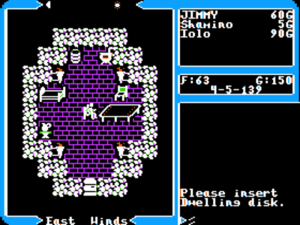
Ultima V‘s screen layout and interface appear superficially all but identical to its predecessor, but a second glance reveals a new depth to the interaction. Note that I’m sitting in a chair here. In addition to the chair, the bed, the torches, the barrel, and the stone are all implemented as objects with which I can interact.
Having now spent almost 4000 words discussing the greater themes of Ultima V, I have to acknowledge that, just as with its predecessor, you spend a relatively small proportion of your time directly engaging with those themes when actually playing. Whatever else it is, this is still a conventional CRPG with all the expected mechanics of leveling-up and monster-killing. As usual for the series, its code is built on the base of its predecessor’s, its screen layout and its alphabet soup of single-letter commands largely the same. Ditto its three scales of interaction, with the abstract wilderness map blowing up into more detailed towns and still more detailed, first-person dungeons. The graphics have been noticeably improved even on the graphically limited 8-bit machines, thanks not least to Denis Loubet’s involvement as Origin’s first full-time artist, and the sound has been upgraded on suitably equipped machines to depict the splashing of water in fountains and the chiming of clocks on walls. Still, this is very much an Ultima in the tradition stretching all the way back to Akalabeth; anyone who’s played an earlier game in the series will feel immediately comfortable with this one.
That means that all the other things that Ultima fans had long since come to expect are still here, sometimes for better, sometimes for worse. The hilariously awful faux-Elizabethan diction, for instance, is still present and accounted for. (One of my favorite examples this time out is a father telling his son he needs an attitude adjustment, a slang phrase very en vogue at the time of Ultima V‘s release courtesy of countless harried sitcom parents: “Thou shalt take a year off from magic, Mondain, to improve thy attitudes.”) And there’s still the sense of an earnest but not yet hugely well-traveled young man — physically or intellectually — punching a bit above his weight in trying to create a new world out of whole cloth. For instance, with Garriott apparently starting to feel uncomfortable with the whole divine-rule-of-kings thing, Britannia has now become a republic with an uncanny resemblance to the only republic with which Garriott is at all familiar, that of the United States; Lord British, naturally, sits in for the President. Even the story of the government’s founding mirrors that of the American Constitutional Convention. Tolkienesque world-building, needless to say, this is not.
For all its additional complexities of theme and plot, Ultima V actually exhibits more continuity with its predecessor than any earlier Ultima. For the first time in an Ultima, it’s possible to import your character from the previous game, an innovation dating back to the second Wizardry game that most other CRPG series had long embraced. And the overland map of Britannia in Ultima V is, apart from that new volcano that popped up where a dungeon used to be, almost exactly the same as that of Ultima IV.
At the same time, however, Ultima V is a vastly bigger and even more ambitious game than its predecessor. Positioned in the same places on the overland map though they are, all of the towns, castles, and dungeons have been extensively remodeled and expanded during the (Britannic) years that have passed between the two games. And if that’s not enough space for adventure, there’s of course also the huge Underworld that’s been added. The magic system has been revamped and better systemized, now sporting almost twice as many spells — almost fifty in total — that are divided into eight “circles” of power. The parser-based conversation system, while superficially unchanged from that of Ultima IV, now understands much, much more, and delivers more text back in response to every query.
But the heart of Ultima V‘s ambition is not in the sprawl but in the details. Ultima V‘s Britannia must still stand as one of the more impressive virtual worlds ever made. Many of its complexities are seldom seen even in games of today. To see them in a game that runs in 64 K of memory feels nothing short of miraculous. Every object in every room is now an object of its own in the programmatic as well as visual sense, one that can be realistically manipulated: torches can be taken off walls, chairs can be sat in, harpsichords can be played. Just as impressive is the game’s implementation of time. As you play, not only does day cycle to night and back again, but the seasons change, the fields filling with crops over the course of the growing season and then appearing bare and forlorn again when winter comes. Unbeknownst to many players, even the cycles of the heavens are scrupulously modeled, two moons and eight other planets moving across the sky, each according to its own orbit. Every five and a half years comes a full planetary alignment, which you can witness if you happen to look through a telescope at just the right instant. This Britannia is a land bursting with secrets and wonders, truly an unprecedented achievement in its day in virtual world-building.
In keeping with the new focus on temporal change, characters now follow daily schedules instead of standing endlessly in one spot. Consider Jeremy, who lives and works in the inn in the city of Yew. He gets up from his back-room lodgings at 9:00 each morning to go to the prison to visit his brother, who’s been incarcerated there under Blackthorn’s heresy laws. He gets back to the inn in time for the lunch rush, and spends the whole day working in the kitchen. After closing time, he visits his brother once more, then returns to his room to sleep. Meanwhile the entire town is following similar patterns; virtually everyone stops at Jeremy’s inn for a bite to eat and a bit of gossip at some point during the day. Guard shifts change; drawbridges and portcullises go up and down; shops open and close. Coupled with the richer conversations, it’s enough to make the inhabitants of the town feel like real people living real lives rather than conversation vending machines waiting for the Avatar to step up and trigger a clue, a joke, or a non sequitur.
Indeed, this version of Britannia as a whole is a less artificial place than Ultima IV‘s. While all of the towns from that game remain, each still corresponding to a Virtue, the correspondence is less neat. Garriott:
When you walk into a town it should look like a bustling Medieval village, with all the normal kinds of things you’d expect to find in a town, but there are only six characters that you have a chance to meet and talk to. These six characters don’t tell you straight out that “Moonglow is the city of Honesty,” for example. It’s not like honesty awards are plastered everywhere. It’s more that because of the nature of commerce in this town, because of what is important to these people, honesty is a consistent trait. You might hear, “By the way, everyone around here is pretty honest. It’s one of the things that we pride ourselves on around here.” Like “everything is bigger in Texas,” that kind of thing.
There are welcome signs that Garriott and his development team have themselves taken note of many of the things I complained about in my article on Ultima IV — those things that, at least in my contrarian opinion, made that game a fascinating one to talk about but not always a terribly compelling one to play. Major steps have been taken to reduce the tedium factor. As Garriott attests above, the non-player characters in the towns and castles are among a few things in Ultima V that have wisely been reduced in number in comparison to its predecessor. Instead of having to lawnmower through dozens of pointless conversations in every town, you’re left with a smaller number of personalities who fit with the world and who are actually interesting to speak to — in other words, no more Paul and Linda McCartney wandering around quoting lyrics from their latest album. The pain of the endless combat in Ultima IV is similarly reduced, and for similar reasons. There are far fewer monsters roaming the Britannic countryside this time around (another result of Blackthorn’s law-and-order policies?), and when you do have to fight you’ll find yourself dropped into a more complex combat engine with more tactical dimensions. The dungeons, meanwhile, are stuffed with interesting scripted encounters — perhaps too interesting at times, like that room of the children — rather than endless wandering monsters. Mixing reagents for spells is still incredibly tedious, and Garriott has devised one entirely new recipe for aggravation, a runic alphabet used by most of the printed materials you find in the game that must be laboriously decoded, letter by letter, from a chart in the manual. Nevertheless, on balance he has given us a much more varied, much less repetitive experience.
But alas, many of Ultima IV‘s more intractable design problems do remain. Solving Ultima V is still a matter of running down long chains of clues, most of them to be found in only one place in this vast world, and often deliberately squirreled away in its most obscure corners at that. Even if you can muster the doggedness required to see it through, you’re all but guaranteed to be completely stymied at at least one point in your journeys, missing a clue and utterly unsure where to find it in the whole of Britannia. The cycles of time only add to the difficulty; now you must often not only find the right character to get each clue, but also find the right character at the right time. Ultima V is in the opinion of many the most difficult Ultima ever made, a game that’s willing to place staggering demands on its player even by the standards of its own day, much less our own. This is a game that plops you down at its beginning, weak and poorly equipped, in a little cottage somewhere in Britannia — you have no idea where. Your guidance consists of a simple, “Okay, go save the world!” The Ultima series has never been known for coddling its players, but this is approaching the ridiculous.
I think we can find some clues as to why Ultima V is the way it is in Garriott’s development methodology. He has always built his games from the bottom up, starting with the technical underpinnings (the tile-graphics engine, etc.), then creating a world simulated in whatever depth that technology allows. Only at the end does he add the stuff that makes his world into a proper game. Ironically given that Ultima became the CRPG series famed for its plots, themes, and ideas, said plots, themes, and ideas came in only “very, very late in the development” of each game. The structure of play arises directly from the affordances of the simulated world. A classic example, often cited by Garriott, is that of the harpsichord in Ultima V. After adding it on a lark during the world-building phase, it was natural during the final design phase to give it some relevance to the player’s larger goals. So, he made playing it open up a secret panel; therein lies an item vital to winning the game. Garriott:
[This approach] makes a great deal of sense to me. The worst example of this is exactly the wrong way to design your game. If I say, “Here’s a story, pick any book at random, make me a game that does that,” it won’t work. The reason why is because that story is not written with “Is the technology feasible?” in mind. By definition it will not be as competitive as my game is because I have chosen specific story elements that the technology shows off particularly well. It required little, if any, extra work, and it works well with all the other elements that can exist. It is designed to adhere to the reality that you can pull off technologically. By definition, it fits within the reality of Britannia.
And every time a new management person comes in and says, “Richard, you’re doing it all wrong,” I make my case, and eventually they either give up on me or become a convert.
It’s interesting to note that Garriott’s process is the exact opposite of that employed by a designer like, say, Sid Meier, who always comes up with the fictional premise first and only then figures out the layers of technology, simulation, and gameplay that would best enable it. While I’m sure that Garriott is correct in noting how his own approach keeps a design within the bounds of technical feasibility, the obvious danger it brings is that of making the actual game almost a footnote to the technology and, in the case of the Ultima games in particular, to the elaborate world-building. A couple of other landmark CRPGs were released during 1988 (fodder for future articles) whose designers placed more and earlier emphasis on the paths their players would take through their worlds. In contrast to the fragile string of pearls that is Ultima V, these games offer a tapestry of possibilities. Later CRPGs, at least the well-designed ones, followed their lead, bringing to an end that needle-in-a-haystack feeling every 1980s Ultima player knows so well. Among those later CRPGs would be the later Ultimas, thanks not least to some new voices at Origin who would begin to work with Garriott on the designs as well as the technology of his creations. If you’re dismayed by my contrarian take on the series thus far, know that we’re getting ever closer to an Ultima that even a solubility-focused old curmudgeon like me can enjoy as much as he admires. For now, suffice to say that there’s enough to admire in Ultima V as a world not to belabor any more its failings as a game design.
That said, there are other entirely defensible reasons that Ultima V doesn’t hold quite the same status in gaming lore as its illustrious predecessor. Ultima IV was the great leap, a revolutionary experiment for its creator and for its genre. Ultima V, on the other hand, is evolution in action. That evolution brings with it hugely welcome new depth and nuance, but the fact remains that it could never shock and delight like its predecessors; people had now come to expect this sort of thing from an Ultima. Certainly you don’t find for Ultima V anything like the rich, oft-quoted creation story of Ultima IV, the story of how Garriott first came to think about the messages he was putting into the world. And that’s fine because his eyes were already open when he turned to Ultima V. What more is there to say?
Nor did Ultima V have quite the same immediate impact on its fans’ hearts and minds as did its predecessor. Ultima V‘s message is so much messier, and, Garriott himself now being a little older, is less tuned to the sensibilities of the many teenagers, as craving of moral absolutism as ever, who played it when it first appeared. Far better for them the straightforward Virtues of the Avatar. One can only hope that the message of this game, subtler and deeper and wiser, had its effect over time.
Whatever you do, don’t let my contrariness about some of its aspects distract from Ultima V‘s bravest quality, its willingness to engage with shades of gray in a genre founded on black and white. The game never, ever veers from its mission of demonstrating that sometimes Virtue really must be its own reward, not even when it comes to the traditional moment of CRPG triumph. When you finally rescue Lord British and save Britannia at the end of Ultima V, you’re ignominiously returned to Earth. In the anticlimax, you return to your apartment to find it broken into, your things stolen. Sigh. Hope you had insurance. It’s a messy old world out there, on Earth as on Britannia.
(Sources are listed in the preceding article. Ultima V is available from GOG.com in a collection with its predecessor and sequel.)
Footnotes
| ↑1 | The classic hagiography of Garriott still has to be Shay Addams’s 1990 Official Book of Ultima. Here’s Garriott the teenage Lothario, deigning to allow some of his many girlfriends to sit with him while he programs his fantastic creations: “My girlfriends, who understood what was going on in those days and were a big part of my life, and who always showed up in the games, would sit right behind me in the same chair at my desk.” Resting her head on Garriott’s shoulder, she would “just sit there watching me program a few lines and test it, and watch the creation unfold.” And here’s Garriott the scholar, plumbing musty old tomes to come up with a magic system: “A full moon hovered over the skyline, casting a pale gold glow on the crinkled pages of the leather-bound tome as Garriott slowly thumbed through it at his desk. Magic was in the making, for his task was nothing less than to coin the language of magic that would be spoken by the mages and wizards of Ultima V. Planning to quickly ferret out a suitable synonym for poison and call it a night, he’d hauled the massive 11-language dictionary from the shelf hours ago. But so engrossed did he become with the subtle nuances and shades of meaning, so captivated by the alluring assortment of nouns and adjectives and verbs, that he sat over its faded pages long after choosing the Latin ‘noxius,’ from ‘noxa,’ to harm, and abbreviating it to ‘nox.'” |
|---|
